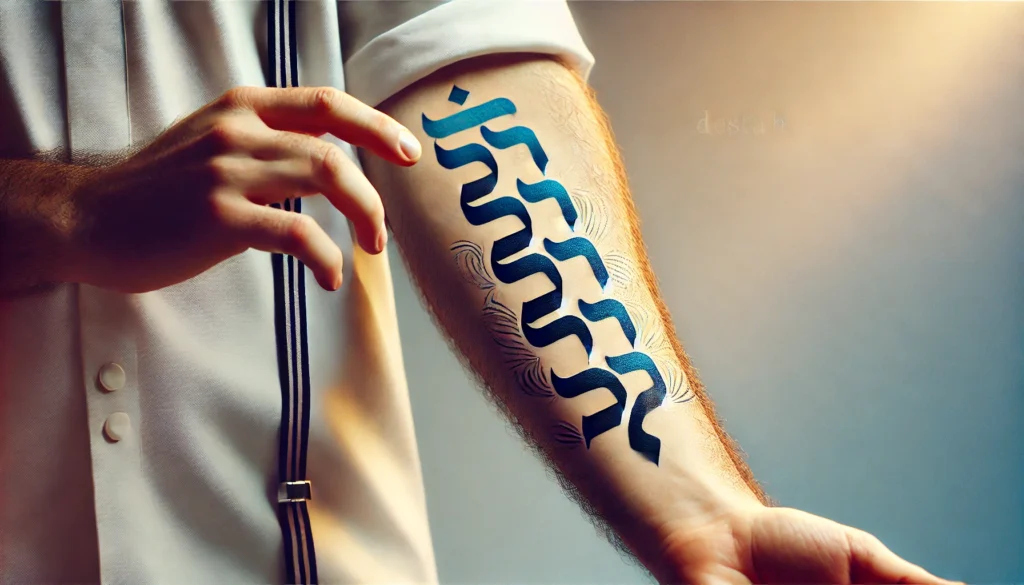Tattoos have become an expression of identity, culture, and personal significance. Among the various tattoo designs, Hebrew script tattoos have gained immense popularity due to their unique aesthetic appeal and deep cultural meaning. One of the common questions people ask when considering a Hebrew tattoo is the cost involved. If you are planning to get a Hebrew tattoo, especially one with the name “קולין ברייס,” this guide will provide you with detailed insights into the “price of a tattoo in Hebrew on arm קולין ברייס” and everything you need to know before getting inked.
Factors That Influence the Price of a Tattoo in Hebrew on Arm קולין ברייס
The cost of a tattoo varies significantly based on several factors. Whether you are getting a small name tattoo or a larger design, here are the key elements that influence the price:
Size and Complexity of the Tattoo
The size of your tattoo plays a crucial role in determining the price. A simple Hebrew name tattoo such as “קולין ברייס” in a basic font will cost less than a larger, more intricate design. Generally, a small tattoo of this nature can range from $150 to $200, while more detailed designs incorporating additional elements, such as decorative fonts or imagery, can cost between $300 and $400.
Experience and Reputation of the Tattoo Artist
Choosing an experienced tattoo artist specializing in Hebrew script is essential. An artist who has experience with Hebrew calligraphy ensures that the letters are well-formed and accurately translated. Highly skilled artists typically charge more due to their expertise, with prices ranging from $100 to $250 per hour. If the tattoo is done by a well-known artist, you may need to pay a premium.
Geographical Location of the Tattoo Studio
Tattoo prices vary based on the city and country where you are getting your tattoo. In major metropolitan areas with high living costs, such as New York, Los Angeles, or London, tattoo prices are generally higher compared to smaller towns. A Hebrew tattoo in these locations could cost 20-30% more than in smaller cities or rural areas.
Tattoo Placement and Pain Tolerance
The placement of the tattoo also affects the cost. Arm tattoos are generally more affordable compared to areas like ribs, neck, or spine due to easier accessibility for the artist. However, if you opt for a design that wraps around your arm or covers a large area, it might increase the price.
Time Required to Complete the Tattoo
Tattoo artists charge either per hour or per design. A small Hebrew name tattoo may take around 30 minutes to an hour, while a more elaborate design can take multiple sessions. The longer the tattooing process, the higher the cost.
Cultural and Aesthetic Appeal of Hebrew Tattoos
Hebrew tattoos hold deep significance for many individuals. Whether it is a personal connection to Jewish heritage, biblical references, or an appreciation for the ancient script, Hebrew tattoos have a timeless appeal. The elegant structure of Hebrew letters makes them a popular choice for meaningful tattoos.
Understanding the Meaning Behind the Tattoo
If you are getting a Hebrew tattoo, especially a name like “קולין ברייס,” ensure that you understand its meaning. Hebrew is read from right to left, and any misinterpretation or incorrect letter formation can alter the intended message.
Aftercare and Maintenance of Your Hebrew Tattoo
Once you get your tattoo, proper aftercare is crucial for preserving its quality and ensuring it heals well. Here are some essential aftercare tips:
Keep the Tattoo Clean
After getting a tattoo, keep the area clean by washing it gently with mild soap and lukewarm water. Avoid scrubbing the tattoo to prevent irritation.
Moisturize Regularly
Use a fragrance-free, alcohol-free moisturizer to keep your tattoo hydrated. Dry skin can lead to fading and peeling, which affects the appearance of the tattoo.
Avoid Sun Exposure
Direct sunlight can cause tattoos to fade over time. Always apply sunscreen or cover your tattoo when spending time outdoors.
Follow the Artist Aftercare Instructions
Your tattoo artist will provide you with specific aftercare instructions. Follow these guidelines carefully to ensure proper healing and longevity of the tattoo.
Is Getting a Hebrew Tattoo Worth It?
Many individuals opt for Hebrew tattoos due to their profound meaning and elegant style. However, before getting one, consider the following:
- Accuracy of Translation: Ensure that the tattoo is correctly translated and spelled to avoid mistakes.
- Personal Significance: Hebrew tattoos often carry deep personal or religious significance.
- Pain and Healing: Understand the pain levels associated with getting a tattoo and the healing process.
If you value cultural heritage, aesthetics, and meaningful symbolism, getting a Hebrew tattoo is definitely worth considering.
Final Thoughts
The price of a tattoo in Hebrew on arm קולין ברייס depends on multiple factors, including size, complexity, artist reputation, and location. By understanding these aspects, you can make an informed decision about getting your tattoo. Ensure that you choose a skilled artist, consider aftercare, and embrace the cultural significance of your tattoo for a lasting and meaningful piece of body art. Whether for personal expression or cultural appreciation, a Hebrew tattoo can be a beautiful and meaningful addition to your journey.
Frequently Asked Questions (FAQs)
1. How much does it cost to get a Hebrew tattoo on the arm? The cost of a Hebrew tattoo on the arm can range from $150 to $400, depending on size, complexity, and artist experience.
2. Is it important to choose a tattoo artist experienced in Hebrew script? Yes, selecting an artist skilled in Hebrew calligraphy is crucial to ensure accurate letter formation and proper meaning.
3. How long does it take to get a Hebrew name tattoo on the arm? A small Hebrew name tattoo can take around 30 minutes to an hour, while larger designs may require multiple sessions.
4. Do Hebrew tattoos fade over time? Like all tattoos, Hebrew tattoos can fade with time. Proper aftercare, including sun protection and moisturizing, can help maintain their appearance.
5. Is it painful to get a tattoo in Hebrew on the arm? Pain levels depend on individual tolerance, but arm tattoos are generally considered less painful than areas with thinner skin or more bones, such as ribs or hands.
Read More: Can a 5800H Do PS4 Emulation and 3060 Mobile: A Comprehensive Guide







